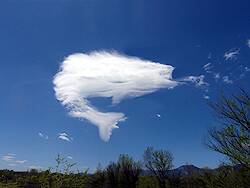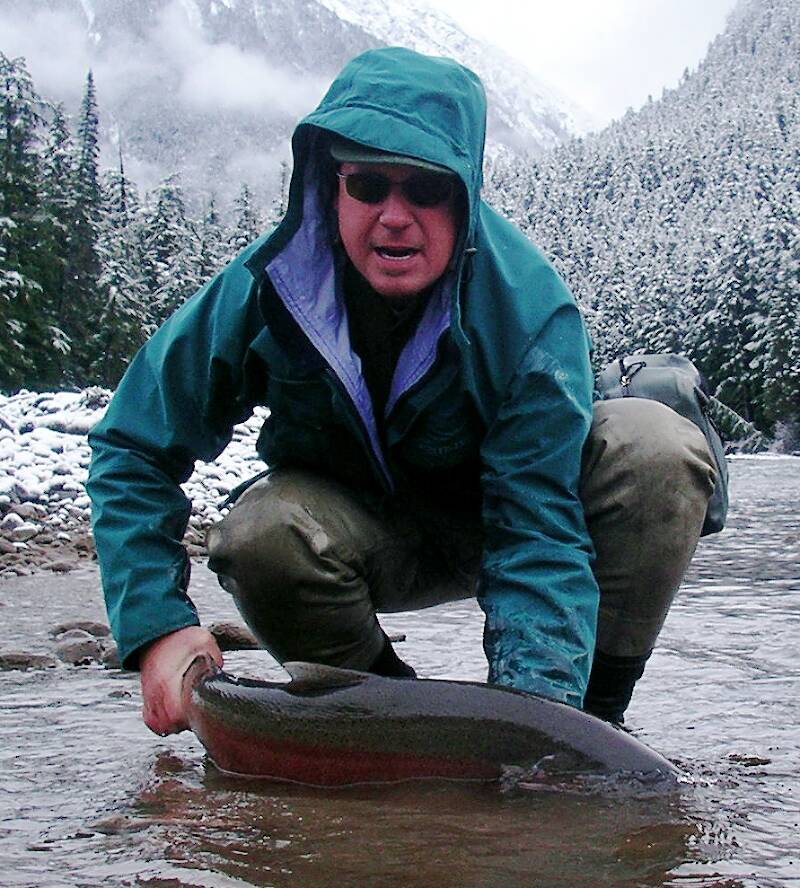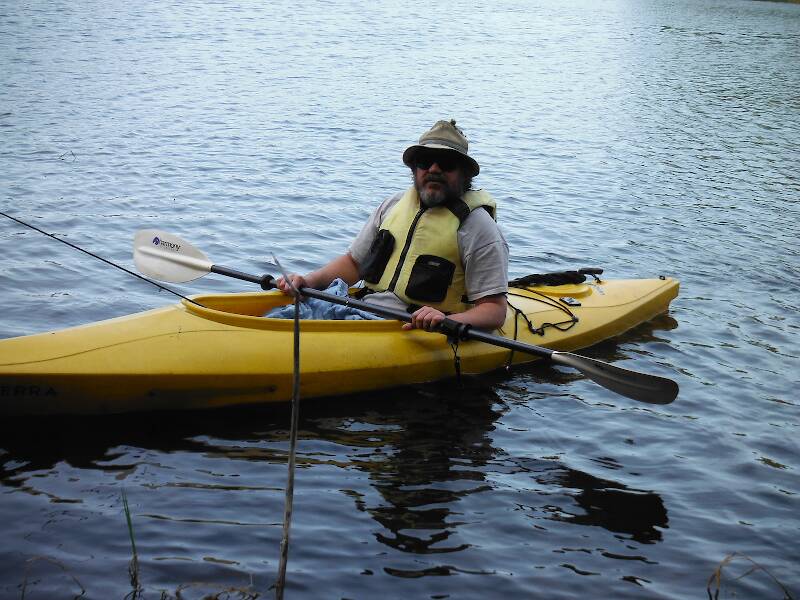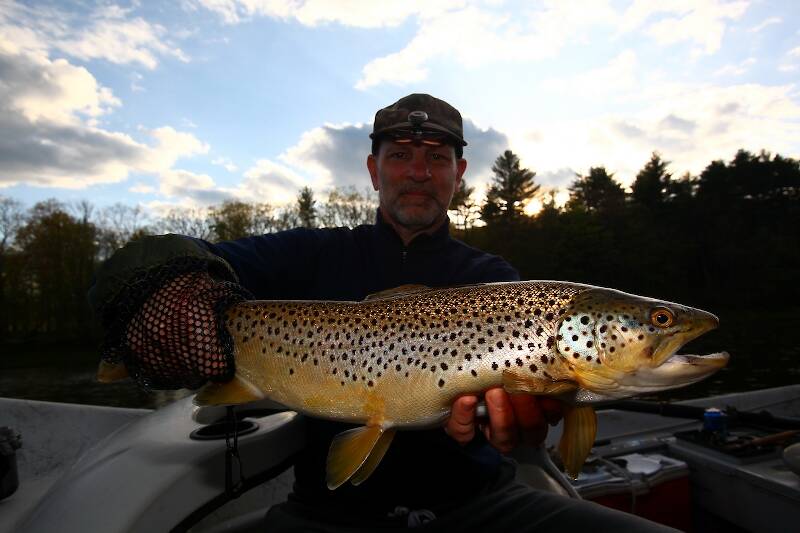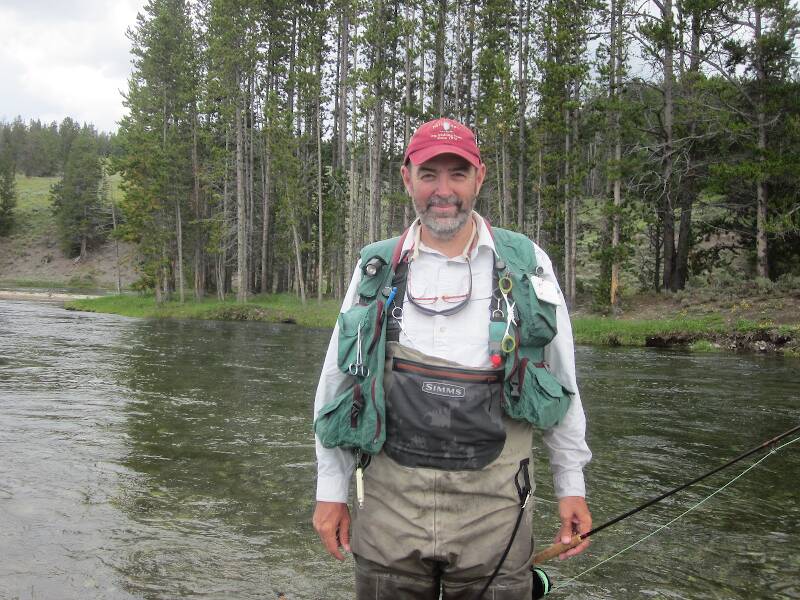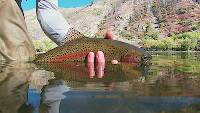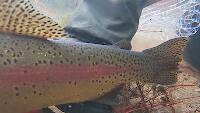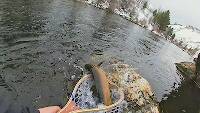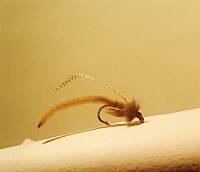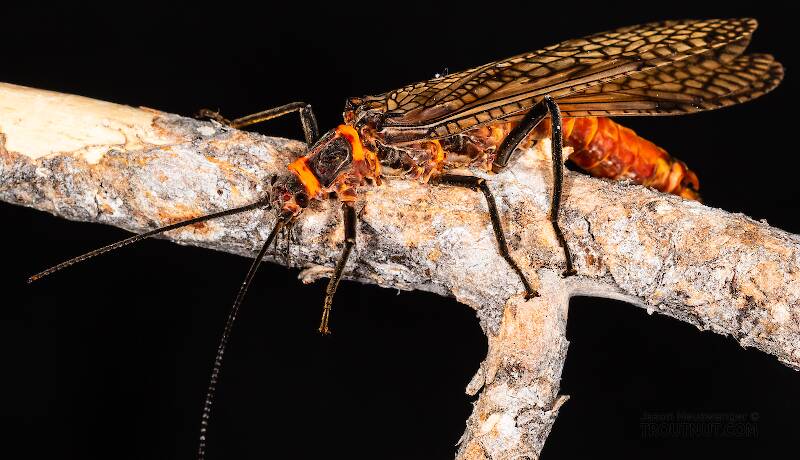
Salmonflies
Pteronarcys californica
The giant Salmonflies of the Western mountains are legendary for their proclivity to elicit consistent dry-fly action and ferocious strikes.
Featured on the forum
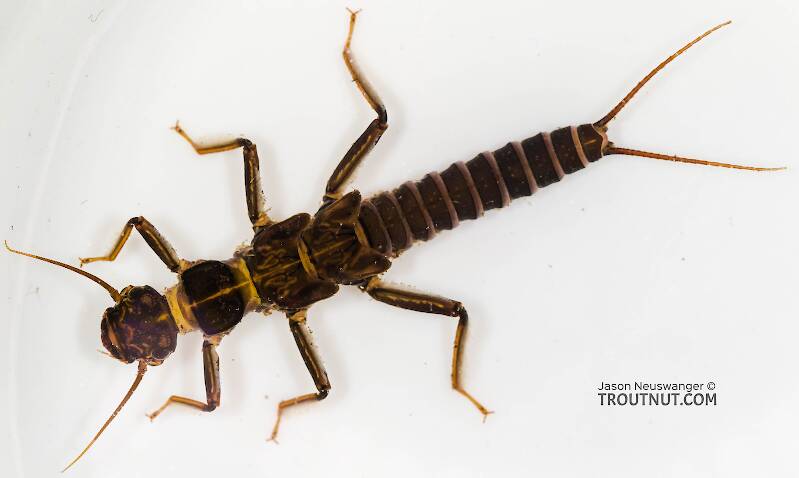
As far as I can tell, this species has only previously been reported from one site in Oregon along the Columbia gorge. However, the key characteristics are fairly unmistakable in all except for one minor detail:
— 4 small yellow spots on frons visible in photos
— Narrow occipital spinule row curves forward (but doesn’t quite meet on stem of ecdysial suture, as it's supposed to in this species)
— Short spinules on anterior margin of front legs
— Short rposterior row of blunt spinules on abdominal tergae, rather than elongated spinules dorsally
I caught several of these mature nymphs in the fishless, tiny headwaters of a creek high in the Wenatchee Mountains.
— 4 small yellow spots on frons visible in photos
— Narrow occipital spinule row curves forward (but doesn’t quite meet on stem of ecdysial suture, as it's supposed to in this species)
— Short spinules on anterior margin of front legs
— Short rposterior row of blunt spinules on abdominal tergae, rather than elongated spinules dorsally
I caught several of these mature nymphs in the fishless, tiny headwaters of a creek high in the Wenatchee Mountains.

Troutnut is a project started in 2003 by salmonid ecologist Jason "Troutnut" Neuswanger to help anglers and
fly tyers unabashedly embrace the entomological side of the sport. Learn more about Troutnut or
support the project for an enhanced experience here.
PaulRoberts on Feb 26, 2014February 26th, 2014, 6:06 pm EST
There is a much greater trout biomass now that it is mandatory catch and release than when it was a selective harvest stream.
Nice try, Reed...
Just for the record, Reed did not write this article. It was written by a John Nelson of Soldotna, AK. He’s, apparently, a woodcarver.
Nelson is not likely an AR plant either. He’s just …angry. He’s invoking an age old argument in fisheries management. It’s essentially over the rights of ownership of natural resources, often split along cultural or class lines. My guess is his main beef is the right of Alaskan residents over tourist anglers that get catered to, probably out of proportion, or at least in proportion to the money each can bring in.
High quality fisheries are expensive to maintain. In much of the world, they aren't really maintained much at all. Don't know what to tell him, except that barring some apocalypse, he's not likely to have Alaska all to himself. Of course there's an awful lot of it. Since he said "heavily fished" waters, I suppose he wants his Alaska close to home too.
Overmywader
Posts: 31
Posts: 31
Overmywader on Feb 26, 2014February 26th, 2014, 7:53 pm EST
No, I didn't write that article. John Nelson is a fisherman who is enthusiastic about his sport and protective of the waters.
As someone mentioned, legislated catch and release fishing is an inroad for PETA. PETA and like-minded groups used catch and release angling as an argument to get some European countries to enact laws which insist upon catch and keep -- every fish caught must be kept. The reasoning was that any injury to an animal should be justified by need, otherwise the injury was torture. Sustenance is need.
IIRC, the first water set aside in the US for fly-fishing-only was below the dam on Grand Lake Stream, Maine. That was prior to 1903.
As someone mentioned, legislated catch and release fishing is an inroad for PETA. PETA and like-minded groups used catch and release angling as an argument to get some European countries to enact laws which insist upon catch and keep -- every fish caught must be kept. The reasoning was that any injury to an animal should be justified by need, otherwise the injury was torture. Sustenance is need.
IIRC, the first water set aside in the US for fly-fishing-only was below the dam on Grand Lake Stream, Maine. That was prior to 1903.
PaulRoberts on Feb 26, 2014February 26th, 2014, 11:31 pm EST
Sustenance as need.
Hmmmmm... Well that cetainly simplifies things, but is less than satisfactory. At what level of "need" might the cutoff potentially be? Are modern rod-n-reel anglers in need of these fish? Might a net do the job with less "trauma" to the fish? Could it not be done under the supervision of a licensed veterinarian?
Hmmmmm... Well that cetainly simplifies things, but is less than satisfactory. At what level of "need" might the cutoff potentially be? Are modern rod-n-reel anglers in need of these fish? Might a net do the job with less "trauma" to the fish? Could it not be done under the supervision of a licensed veterinarian?
Entoman on Feb 27, 2014February 27th, 2014, 7:27 pm EST
I wished the author made the argument based on the health of the fishery and maximizing angler rights with that in mind. If he can make a cogent argument that the former can be enhanced or maintained with substantial harvest, I'd fully support him in his desire for the largest harvest possible. Where he loses me is when he invokes a moral argument based on the supposition of fish torture as a rationale. Followed to its logical conclusion.... well, it's just a very slippery slope.:(
"It's not that I find fishing so important, it's just that I find all other endeavors of Man equally unimportant... And not nearly as much fun!" Robert Traver, Anatomy of a Fisherman
PaulRoberts on Feb 27, 2014February 27th, 2014, 9:51 pm EST
I think being mindful of potential suffering is an appropriate consideration, which might need to be given a looser definition where fish are concerned. But I'm not convinced catching fish on appropriate tackle, and handled well upon capture, actually amounts to "suffering" much less "torture". Not that I haven't seen situations and acts in which fish underwent something akin to torture in capture however -more often with large hardware and bait gear however than with FF gear.
Stress might be the more apt term, although research I've seen suggests that angling caught fish are not greatly hindered by the experience except in certain circumstances -ones that most C&R FFers recognize pretty readily.
Stress might be the more apt term, although research I've seen suggests that angling caught fish are not greatly hindered by the experience except in certain circumstances -ones that most C&R FFers recognize pretty readily.
TNEAL on Feb 28, 2014February 28th, 2014, 3:02 am EST
Sustenance as need.
Hmmmmm... Well that cetainly simplifies things, but is less than satisfactory. At what level of "need" might the cutoff potentially be? Are modern rod-n-reel anglers in need of these fish? Might a net do the job with less "trauma" to the fish? Could it not be done under the supervision of a licensed veterinarian?
how about under supervision of a licensed vegetarian?
Jmd123 on Feb 28, 2014February 28th, 2014, 5:41 pm EST
Hey, isn't Spence a licensed vegetarian? He could have a whole new line of work cut out for him! Maybe I should get a license? Nah, would have to give up yellow perch then...
Sorry Spence, I just violated the second of your rules, if only for some comic relief on another bitterly cold winter's night in northern Michigan...
I guess my basic hang-up with this article is the whole "fish torture" thing. Fish face difficult survival odds all their lives, and those that get big enough for us to brag about and share photos on here have faced more than most, otherwise they wouldn't be that big! Someone would have eaten them by now...So a fisherman comes along and puts said fish in a struggle for it's survival - something the fish has been dealing with all it's life, with predators far more efficient than humans - for a brief period of time, then releases said fish, with hopefully a short fight, gentle and wet handling, and plenty of revival time before ultimate release...is this not what fish are bred for, survival? And, are we not all maddened by fish who won't fall for our flies because they are "too smart"? Like this sport is too easy or something?
Seriously, a fish caught and released by a fly fisherman using a relatively small hook - most of mine are #10-16, I know you all often use smaller ones - taking the care described above is no more "fish torture" than getting away from the otter that bit a piece out of your tail!
OK, latest rant completed...I do feel better now.
Jonathon
Sorry Spence, I just violated the second of your rules, if only for some comic relief on another bitterly cold winter's night in northern Michigan...
I guess my basic hang-up with this article is the whole "fish torture" thing. Fish face difficult survival odds all their lives, and those that get big enough for us to brag about and share photos on here have faced more than most, otherwise they wouldn't be that big! Someone would have eaten them by now...So a fisherman comes along and puts said fish in a struggle for it's survival - something the fish has been dealing with all it's life, with predators far more efficient than humans - for a brief period of time, then releases said fish, with hopefully a short fight, gentle and wet handling, and plenty of revival time before ultimate release...is this not what fish are bred for, survival? And, are we not all maddened by fish who won't fall for our flies because they are "too smart"? Like this sport is too easy or something?
Seriously, a fish caught and released by a fly fisherman using a relatively small hook - most of mine are #10-16, I know you all often use smaller ones - taking the care described above is no more "fish torture" than getting away from the otter that bit a piece out of your tail!
OK, latest rant completed...I do feel better now.
Jonathon
No matter how big the one you just caught is, there's always a bigger one out there somewhere...
Martinlf on Mar 1, 2014March 1st, 2014, 4:27 pm EST
Not to mention that being caught and released might make some fish less likely to be caught later by someone who would kill and eat them. And I'd think a slow death on a stringer would be a pretty bad fate, even for an animal with a brain the size of a pea. So, could the argument be made that the catch and release angler may potentially provide an education that would increase a fish's chances to avoid trauma and enhance its chances to survive?
"He spread them a yard and a half. 'And every one that got away is this big.'"
--Fred Chappell
--Fred Chappell
TNEAL on Mar 1, 2014March 1st, 2014, 5:01 pm EST
Flies have retrieved from the jaws of large browns in less than 24 hours by placing a very similar fly in those same jaws; perhaps just a slow learner?
Martinlf on Mar 1, 2014March 1st, 2014, 7:13 pm EST
"might make some fish" :)
"He spread them a yard and a half. 'And every one that got away is this big.'"
--Fred Chappell
--Fred Chappell
Oldredbarn on Mar 2, 2014March 2nd, 2014, 10:16 am EST
Not to mention that being caught and released might make some fish less likely to be caught later by someone who would kill and eat them. And I'd think a slow death on a stringer would be a pretty bad fate, even for an animal with a brain the size of a pea. So, could the argument be made that the catch and release angler may potentially provide an education that would increase a fish's chances to avoid trauma and enhance its chances to survive?
Louis. I've been using this rationale for decades. :) I'm just educating fish to keep them out of the frying pan. "Don't be so stupid next time! How many times to I have to tell you not to fall for the fakes?! Next time your ass is fried in butter, dumkopf!" The German is for those Euro imports. :)
I'm afraid though that Tim's probably correct. How many times have we, the so-called, "great ape", made the same mistake over and over again, and asked ourselves, "when the hell am I going to stop this"? I guess the pea-brained trout can be forgiven.
Besides. Tim does tie up some pretty sweet flies, and I've fallen for them over and over again in the fly shops up in Grayling since 1991. Who's the pea-brain here? Hmmmm. :)
Spence
"Even when my best efforts fail it's a satisfying challenge, and that, after all, is the essence of fly fishing." -Chauncy Lively
"Envy not the man who lives beside the river, but the man the river flows through." Joseph T Heywood
"Envy not the man who lives beside the river, but the man the river flows through." Joseph T Heywood
PaulRoberts on Mar 2, 2014March 2nd, 2014, 1:28 pm EST
Here is a reasonably considered piece on the subject, from a fish's side of the issue:
http://www.nal.usda.gov/awic/pubs/Fishwelfare/Rose.pdf
Fish go through physiologic stress when being captured by hook-n-line. But by looking at vertebrate brains anatomically and what's been deciphered functionally, fish do not have the emotional overlay mammals do. Going further, mammals don't have the emotional overlay that apes do. Further, apes don't have the emotional overlay humans do although the foundations are there. The differences across categories are enormous. There is a sense of scale here that is often under-appreciated. Applying cursory consideration, people cannot help but project their own feelings (emotional overlay) on other critters. It's called empathy and within human societies empathy is a good thing to have.
Many (most) people have lost connections with the ecological world from loss of experience. Much of that experience we'd probably all just as soon give up. No one wants to go back 12,000 years, and stay there. I think modern fishing and hunting and gardening (dabbling in our hunter-gatherer past) is a step in the right direction, although it gets exceedingly costly as human populations (and participation) rises.
One more point: We also have to live with our neighbors. Not caring is not an option.
http://www.nal.usda.gov/awic/pubs/Fishwelfare/Rose.pdf
Fish go through physiologic stress when being captured by hook-n-line. But by looking at vertebrate brains anatomically and what's been deciphered functionally, fish do not have the emotional overlay mammals do. Going further, mammals don't have the emotional overlay that apes do. Further, apes don't have the emotional overlay humans do although the foundations are there. The differences across categories are enormous. There is a sense of scale here that is often under-appreciated. Applying cursory consideration, people cannot help but project their own feelings (emotional overlay) on other critters. It's called empathy and within human societies empathy is a good thing to have.
Many (most) people have lost connections with the ecological world from loss of experience. Much of that experience we'd probably all just as soon give up. No one wants to go back 12,000 years, and stay there. I think modern fishing and hunting and gardening (dabbling in our hunter-gatherer past) is a step in the right direction, although it gets exceedingly costly as human populations (and participation) rises.
One more point: We also have to live with our neighbors. Not caring is not an option.
Entoman on Mar 2, 2014March 2nd, 2014, 3:12 pm EST
Interesting, Paul. Besides emotional responses, there's also pain reception as an issue. My understanding is that they don't have a brain that can register pain. Common sense points this out as well. I sure couldn't pull with all my might against a hook sticking me through the jaw.:)
"It's not that I find fishing so important, it's just that I find all other endeavors of Man equally unimportant... And not nearly as much fun!" Robert Traver, Anatomy of a Fisherman
Jmd123 on Mar 2, 2014March 2nd, 2014, 5:36 pm EST
How many of you have ever found big spiny bugs, large water beetles, even wasps in trout? How about crayfish? Some of the things these fish choke down would definitely cause some pain if fish could feel it, at least that's my observation. Hellgrammites? I doubt any one of us would care to crunch down on one of those things...
Jonathon
P.S. I saved the article for more detailed reading. Looks VERY interesting!
Jonathon
P.S. I saved the article for more detailed reading. Looks VERY interesting!
No matter how big the one you just caught is, there's always a bigger one out there somewhere...
PaulRoberts on Mar 2, 2014March 2nd, 2014, 7:41 pm EST
Interesting, Paul. Besides emotional responses, there's also pain reception as an issue. My understanding is that they don't have a brain that can register pain. Common sense points this out as well. I sure couldn't pull with all my might against a hook sticking me through the jaw.:)
Yes, pain reception is part of the missing package according to the author. He equates pain to consciousness (along with emotion) however, there are studies that show responses to potentially painful stimuli in fish that infer extended discomfort. Apparently there are serious issues with the methods and interpretations. And how such "pain" is experienced is up in the air, esp since fish don't have the neocortex mammals do. Here appears to be the latest:
http://www.sciencedaily.com/releases/2013/08/130808123719.htm
How many of you have ever found big spiny bugs, large water beetles, even wasps in trout? How about crayfish? Some of the things these fish choke down would definitely cause some pain if fish could feel it, at least that's my observation. Hellgrammites? I doubt any one of us would care to crunch down on one of those things...
I watched as a large creek chub in an aquarium tried to tackle a full grown fishfly larva. That fishfly clamped down ion the chubs tongue and that was one mighty surprised/alarmed (but not necessarily in pain) chub. It shook its head and spat the fishfly out. Browns eat fishfly larvae though, and they have teeth on their tongues -mostly there to keep slippery fish going in the right direction. Ever seen the teeth on brookie tongues! Holy moly! In relative size they are ... frightening.
Martinlf on Mar 2, 2014March 2nd, 2014, 7:42 pm EST
Are trout under pressure not somewhat generally harder to catch than those that have never seen a fly? That is, if we do not spook them first? Doesn't some learning take place in some fish?
"He spread them a yard and a half. 'And every one that got away is this big.'"
--Fred Chappell
--Fred Chappell
PaulRoberts on Mar 2, 2014March 2nd, 2014, 8:09 pm EST
Are trout under pressure not somewhat generally harder to catch than those that have never seen a fly? That is, if we do not spook them first? Doesn't some learning take place in some fish?
That's a topic that will start some serious arguments on the bass fishing sites, that eventually divides across brain hemisphere affiliation and religiosity (related apparently).
It certainly appears to me that fish can "learn" to avoid angling.
Taxon on Mar 2, 2014March 2nd, 2014, 11:24 pm EST
Louis-
That was certainly a skillfully presented offering. Just for the sake of stirring the pot, please allow me to present an alternate theory. Not unlike flyfishers, some trout are more cautious than others. So in pressured waters, those with a lower CQ don't last long :-)
Are trout under pressure not somewhat generally harder to catch than those that have never seen a fly? That is, if we do not spook them first? Doesn't some learning take place in some fish?
That was certainly a skillfully presented offering. Just for the sake of stirring the pot, please allow me to present an alternate theory. Not unlike flyfishers, some trout are more cautious than others. So in pressured waters, those with a lower CQ don't last long :-)
Taxon on Mar 3, 2014March 3rd, 2014, 6:09 am EST
Who gives a damn if a trout happens to die!
Actually, I do. When lake fishing, on rare occasion I have had to cradle a large trout in both hands for five minutes or more, before it regained the balance and energy necessary to swim away on its own. But that's just me, and I certainly have no criticism of someone with a different view, as long it isn't a catch and release fishery.
Oldredbarn on Mar 3, 2014March 3rd, 2014, 6:57 am EST
Bruce's non-sequitur aside, here's part two...
Well...The feathers are about to fly in good old Michigan!
Spear fishermen go angling for equal rights
A Michigan group founded by some of those who enjoy fishing through the ice is looking forward to summer this year.
The Michigan Darkhouse Angling Association, a Michigan United Conservation Clubs affiliate has introduced a resolution that MUCC will be considering at its annual convention June 20-22 at the Ralph A MacMullan Center in Roscommon. In the resolution, the MDAA asks the DNR to discontinue the practice of reserving bodies of water for select groups of fishermen.
They’re speaking specifically about trout streams and lakes that restrict the gear and methods by which people may fish “flies-only” sections of streams, for example – and places that are closed to winter spearing. According to the MDAA, it’s discriminatory to make it illegal for some anglers to fish in places while allowing others to fish just because they use different gear.
The resolution seeks to have “MUCC work with the Michigan DNR director and the Michigan Natural Resources Commission to adopt a policy for (DNR) Fisheries Division that advocates equal use of the fisheries resource and equal sharing of that resource by all legal angling methods without discrimination.”
MDAA president Mike Holmes says the problems arise when one group assumes ownership of a lake, river or stream, and the fish within them. For example, he says most open-water muskie fisherman do not want spear fisherman to kill even one of the fish they hope to catch when the ice melts. Likewise, he says he sees the same problems on gear-restricted areas of trout streams that keep bait fishermen out.
“We’re not anti-fly fishing or muskie fishing,” Holmes says. “I do both.’ He said he grew up in a fly-fishing family and his grandfather used to build split-bamboo rods. His family also grew up spearing whitefish in the fall and winter on western Upper Peninsula lakes, as well as pike, muskies, and even lake trout through the ice, when it was legal to do so.
Holmes said there has always been animosity between spear fishermen and open-water muskie fishermen, and he says his organization believes the muskie fishermen have been shown preferential treatment, much like the fly-fishermen on more than 200 miles of gear-restricted rivers and streams in the state. As a result, the MDAA is making a push to have fishermen treated equally.
Holmes said he believes the approval of Senate bills 288 and 289, which are now Michigan Public Acts 21 and 22 of 2103 will help the MDAA in its quest. Among other things, the new laws give the NRC the authority to regulate fishing in Michigan, where previously only the DNR director had that authority.
It seems to me the MDAA makes some good points with its resolution. Spearing is hard work. Anyone that thinks otherwise has not tried it. It’s not simply a matter of cutting a hole in the ice and whacking the first thing that swims into view. Spear fishermen spend hours honing their craft, just like other sportsmen. Some create their own decoys and build their own spears, turning a hobby onto an art that they want to pass on to their kids and grandchildren.
Of all the forms of fishing, it seems to me that spear-fishing is more like hunting than it is fishing – and that’s probably why so many people enjoy it. Nevertheless, as years go by, fewer and fewer spear fishermen are heading out to their darkhouses, and it seems many fellow fishermen would prefer it that way.
You have to shake your head when you see the controversies that exist between people that are really out doing the same thing, but using different methods. It’s not just spear-fishermen that are held in contempt by open water fishermen. There are many trout fishermen that shudder at the thought of killing a trout for dinner, no matter how it was caught. There are sturgeon fishermen on the St. Clair River who can’t understand why guys on Black Lake would stick a spear in one of those ancient fish.
And those controversies exist in hunting, too. Many archers think that deer hunting with a firearm is child’s play. Many don’t care for the new guys out there with crossbows, either.
Holmes said his grandfather was a “dyed-in-the-wool” fly-fisherman, as was his father. “But I never heard them say anything negative about anyone else’s activity,” he said. “And they sometimes used their fly rods to bait fish, too.”
He struck a nerve with that comment. I used a fly rod with bait to fish for whitefish long before I ever tried floating a dry fly for trout. And I’ve watched guys in the boat frown at me when the fishing was slow and I hooked a wax worm on the nymph that we were using for whitefish and Atlantic salmon.
I’ll be interested to see how far the MDAA gets with its resolution. If restrictions continue, could it get to the point where a stretch of river is not just “flies-only,” but closed to anything but fly gear of a certain quality? Could it go further? Might we find out some day that our favorite lake or river has been deemed “tobacco-free?” It may sound crazy, but I’ll bet there are plenty of old guys out there who never thought they’d be prohibited from dunking worms in some of their favorite fishing holes.
Well...The feathers are about to fly in good old Michigan!
"Even when my best efforts fail it's a satisfying challenge, and that, after all, is the essence of fly fishing." -Chauncy Lively
"Envy not the man who lives beside the river, but the man the river flows through." Joseph T Heywood
"Envy not the man who lives beside the river, but the man the river flows through." Joseph T Heywood
Quick Reply
Related Discussions
Topic
Replies
Last Reply
Re: Fish that have been caught before may be more likely to be caught again
In General Discussion by Troutnut
In General Discussion by Troutnut
9
Sep 15, 2010
by GONZO
by GONZO
3
Apr 29, 2009
by Trtklr
by Trtklr


